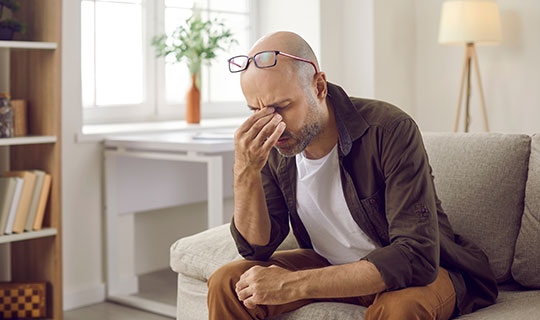
Practical Strategies for Daily Life

Cancer-related fatigue is one of the most common and challenging side effects faced by individuals undergoing cancer treatment. Unlike everyday tiredness, this fatigue is profound, persistent, and not necessarily relieved by rest. It can significantly affect quality of life, making even simple tasks feel overwhelming. While there’s no one-size-fits-all solution, adopting a combination of practical strategies can help manage fatigue and enhance daily functioning.
“December is National Cancer-Related Fatigue Awareness Month, a time to recognize one of most common and challenging side effects of cancer,” says M. Hamza Habib MD, JD, MBA, FACP, FAAHPM, FRCPI, director of Outpatient Palliative Medicine and Cancer Pain Service at Rutgers Cancer Institute, the state’s only NCI-designated Comprehensive Cancer Center. “It is so important that we speak openly with patients about this side effect and encourage them to speak to their health care team who can help them manage it.”
Understanding Cancer-Related Fatigue
Cancer-related fatigue can stem from a variety of factors, including the cancer itself, treatments like chemotherapy or radiation, medications, emotional stress, and changes in sleep patterns. Additionally, nutritional deficiencies and anemia are common contributors. Recognizing that this fatigue is a medical condition — not simply a lack of willpower — is the first step toward effective management.
Prioritize Energy Management
One of the most effective ways to cope with cancer-related fatigue is by practicing energy conservation. This involves pacing yourself throughout the day and focusing on tasks that matter most. Using a diary or planner to track your energy levels can help identify patterns, allowing you to schedule important activities during times when you feel most energized.
“Lifestyle tips that may help alleviate fatigue include drinking plenty of fluids, making an effort to eat at least three meals a day, and engaging in exercise to increase energy levels,” adds Dr. Habib. “While it may seem counterintuitive, gentle physical activity can actually help combat fatigue. Regular exercise, such as walking, yoga, or light stretching, has been shown to improve energy levels and reduce feelings of exhaustion.”
Address Emotional Well-being
Emotional stress, anxiety, and depression can intensify feelings of fatigue. Seeking support through counseling, support groups, or talking with loved ones can make a significant difference. Mindfulness practices such as meditation, deep breathing, or journaling can also help manage stress and improve mental clarity. The Palliative Medicine and Supportive Care Program at Rutgers Cancer Institute and Robert Wood Johnson University Hospital, an RWJBarnabas Health facility, provides not only pain management support, but also emotional support services for patients at all stages of cancer and other serious illnesses. Palliative medicine focuses on the goal of making sure patients do their best physically and mentally to continue receiving disease-directed treatments.
Embrace Self-Compassion
Finally, remember to be kind to yourself. Coping with cancer-related fatigue requires patience and adaptability. Celebrate small victories, honor your body’s needs, and give yourself permission to rest.
By combining these strategies and leaning on your support network, you can take meaningful steps to manage fatigue and improve your quality of life during cancer treatment and beyond.
